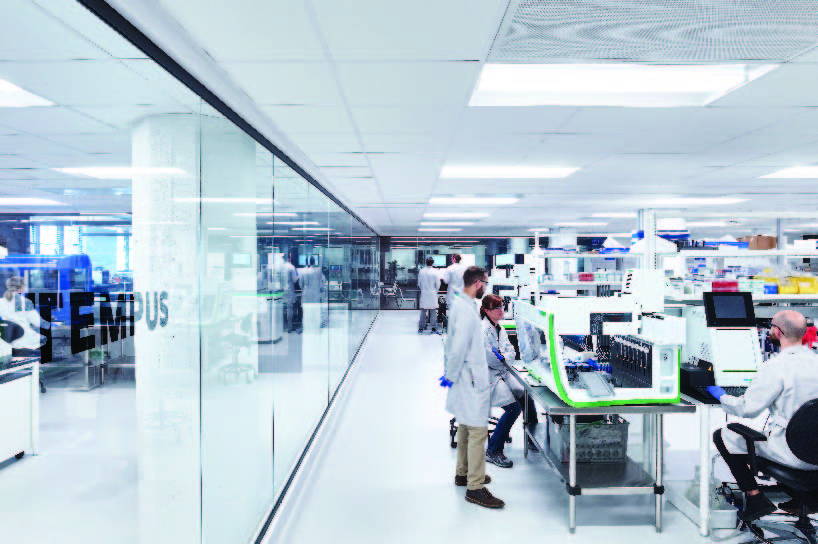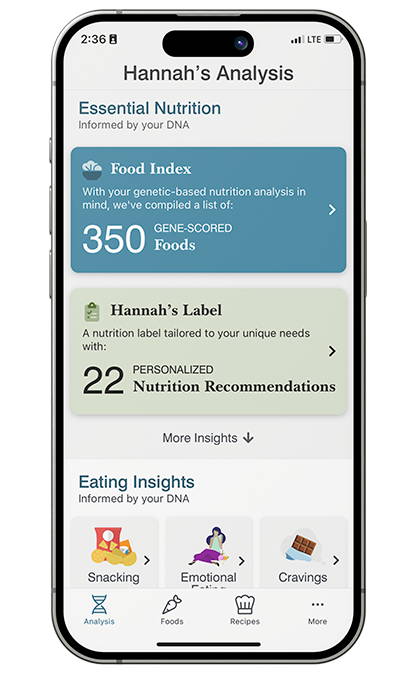"Welcome to Nutrition 101. We are going to take you through the basics of nutrition and food that makeup the backbone of your personalized nutrition report. This information will empower you to make healthier choices at the dinner table, the grocery store or your favorite restaurant."
-Sherry Zhang, Ph.D., Founder & CEO
Food makes energy
Our food is a combination of elements our bodies convert into energy through digestion. The digestion process begins in the mouth and is accelerated by the stomach where acids and enzymes break down what we’ve eaten into particles. The food particles travel to the intestines, where they are absorbed by fingerlike projections called villi, and carried into the bloodstream.
Some nutrients, like fats and proteins, must travel to the liver in order to be processed. While carbohydrates easily break down into glucose when eaten and enter the circulatory system. Regardless of their path, all nutrients are delivered to cells and made into energy.
Macros & Micros
Macronutrients “Macros” are the foods we need in large amounts in order for our bodies to function. There are three macronutrients: carbohydrates, proteins and fats. These provide energy for your body.



Micronutrients “Micros” are nutrients that support the body such as vitamins and minerals. Vitamin C, for example, boosts immunity. Minerals like calcium support bone health and muscle function.
Carbs
Carbohydrates “Carbs” are a macronutrient but not all forms are created equal. Simple carbs (cake, candy and soda) are quickly digested by the body and tend to spike blood sugar. Complex carbs (fruits, vegetables and whole grains) have a slower release into the bloodstream and are packed with vitamins, minerals and fiber.
Fats
Fats provide your body with energy and also support cell growth. They protect your organs, help keep your body warm and produce important hormones. Your body needs fats for the absorption of vitamins A, D, E and K.
Protein
Proteins are made up of amino acids, which are building blocks for your body's tissues such as muscle, skin and hair. Proteins also support the proper functioning of enzymes and hormones.
Fat soluble vs water soluble vitamins
Fat soluble vitamins (vitamins A, D, E and K), are like oil in that they do not dissolve in water. They are absorbed with fats in the diet and stored in the liver and fatty tissue. However, most vitamins are water soluble—meaning they dissolve in water and are not stored in the body. Typically any excess of water soluble vitamins is filtered by the kidneys and excreted in urine.
Food Sensitivities
Genetic testing can not yet determine food allergies or intolerances but genetic variants can indicate if you are likely to be sensitive to lactose or gluten.


Lactose
Lactose is a sugar found in dairy (milk, cheese and ice cream.) If you are lactose intolerant, it means your body does not produce enough lactase, which is the enzyme that breaks down lactose. Genetic variants in the MCM6-LCT gene region and in the LCT gene may make a person more likely to be sensitive to lactose.
Gluten
Research shows that specific genetic variants may make a person more likely to have a gluten sensitivity. Genetic variants in the HLA-DQA1 and HLA-DQ8 may make a person more likely to be sensitive to gluten.


Substance Sensitivities


Caffeine
Caffeine is found in a number of different foods and drinks (coffee, soda and chocolate). It is among the most widely consumed stimulant in the world, meaning it accelerates the activity of the central nervous system. We analyze genetic variants on the CYP1A2 to see how quickly your body metabolizes caffeine.
Alcohol
Alcohol, on the other hand, is a depressant. This means it slows the activity of the central nervous system and can slow speech, lower body temperature, and impair thought processes (when consumed in excess). It is known that genetics play a role in someone’s ability to tolerate (metabolize) all of these substances. We analyze genetic variants on the ADH1B and ADH1C to see how quickly your body metabolizes alcohol.


"Congratulations on learning something new! I can't wait for you to receive your personalized food recommendations."
-Sherry Zhang, Ph.D., Founder & CEO


